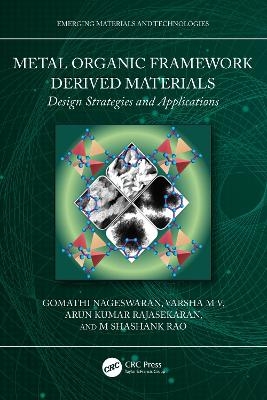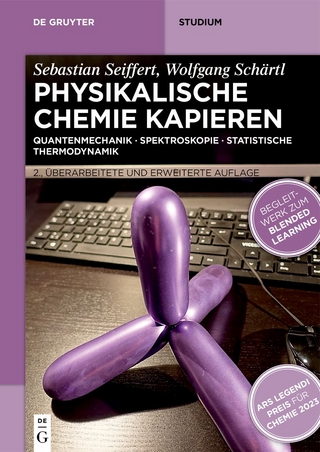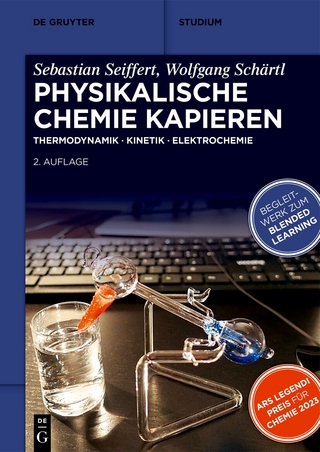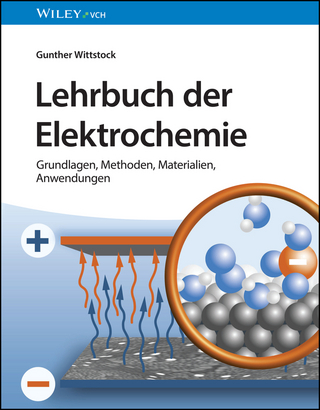
Metal–Organic Framework Derived Materials
CRC Press (Verlag)
978-1-032-48576-8 (ISBN)
Metal-organic frameworks (MOF)-based materials are used for functional applications due to their large surface area, high porosity, tunable structure, controllable morphology, and surface functionality. This book explores MOF-derived materials focusing on their structural features, synthesis methods, unique properties, and versatile applications including underlying chemistry. It covers research developments in the field for design of novel carbon materials and metal-based materials from MOF and their composites, including specific applications.
Features:
Provides a comprehensive idea regarding the fundamental chemistry of MOF-derived materials.
Covers all the aspects of MOF-derived materials with focus on derived carbon/metal species and composite materials.
Includes application of MOF-derived materials specifically for environmental and energy.
Conveys a sense of relation between structure, property, and application of MOF-derived materials.
Explores developments in the different types of MOF-derived materials.
This book is aimed at senior undergraduate, graduate students, and researchers in materials science, chemical engineering, and chemistry.
Gomathi Nageswaran is a Professor at the Indian Institute of Space Science and Technology, an autonomous institute under the Department of Space, Government of India. She received her Ph.D. from the Indian Institute of Technology, Kharagpur, India in 2009. Her current research interests include electrochemical sensing, carbon dioxide adsorption and catalytic applications of metal-organic frameworks-based materials, inorganic quantum dots for fluorescence sensors, membrane-based separation for water purification application, plasma surface modification of nanomaterials for enhanced electrochemical activity, and membrane performance. Varsha M V received her MSc. Degree in Chemistry from Cochin University of Science and Technology, Kerala, India, in 2015. Currently, she is pursuing her Ph.D. degree in Chemistry under the guidance of Dr. N Gomathi, at the Indian Institute of Space Science and Technology (IIST), Thiruvananthapuram, India. Her research work includes development of novel materials based on metal organic framework for the electrochemical sensing of analytes of environmental significance and development of electrocatalysts for water splitting reaction. Arun Kumar Rajasekaran received his MPhil in Scientific Computing from the University of Cambridge and his bachelor's degree in Material Science from NIT-Trichy, India. Currently, he is pursuing his Ph.D. in Chemistry under the guidance of Prof. David Wales, FRS and Dr. Tom Bennett at the University of Cambridge, UK. His research focuses on the computational investigation of MOFs, emphasising their carbon capture ability. He has spent his research stays in India, France, and China working on porous materials. In addition, Arun holds several prestigious research awards, including an Honorary Cambridge Nehru award (2020), a Hughes Hall scholarship (2021), Lundgren research award (2021), Education future award (2019), and several more. His interests also include thermolectric materials, polymer composites, network science, ancient mythology and climate action. M Shashank Rao recieved his B.E degree in Mechanical Engineering from Chaitanya Bharathi Institute of Technology (Osmania University), Hyderabad, India and his M.Tech degree in Material Science and Technology, Indian institute of Space Science and Technology, India. His research interests include the development of MOF and BMOF based adsorbents for CO2 capture and sequestration. Other interests are design of novel catalysts for electrochemical reduction of CO2.
Part 1: Metal-Organic Framework Derived Materials: Fundamentals. 1. Metal-Organic Framework: A brief introduction. 2. Metal-Organic Framework Derived Materials: Classification and Synthesis. 3. Metal-Organic Framework Derived Materials: Structure and Properties. Part 2: Applications of MOF Derived Materials. 4. Adsorption. 5. Catalysis. 6. Sensing. 7. Energy Applications. 8. Environmental Applications. 9. Emerging Applications.
| Erscheinungsdatum | 21.11.2024 |
|---|---|
| Reihe/Serie | Emerging Materials and Technologies |
| Zusatzinfo | 26 Tables, black and white; 15 Line drawings, black and white; 34 Halftones, black and white; 49 Illustrations, black and white |
| Verlagsort | London |
| Sprache | englisch |
| Maße | 156 x 234 mm |
| Gewicht | 571 g |
| Themenwelt | Naturwissenschaften ► Biologie |
| Naturwissenschaften ► Chemie ► Physikalische Chemie | |
| Technik ► Maschinenbau | |
| Technik ► Umwelttechnik / Biotechnologie | |
| ISBN-10 | 1-032-48576-0 / 1032485760 |
| ISBN-13 | 978-1-032-48576-8 / 9781032485768 |
| Zustand | Neuware |
| Informationen gemäß Produktsicherheitsverordnung (GPSR) | |
| Haben Sie eine Frage zum Produkt? |
aus dem Bereich


